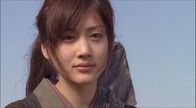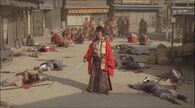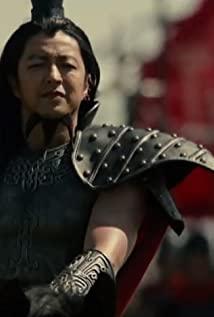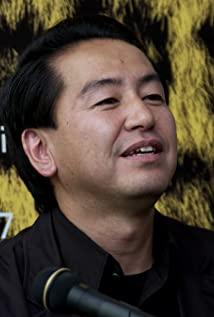Then I remembered that this is a Japanese movie, and it cannot be explained with a Hollywood-style perfection or a Chinese-style reunion.
It seems to be a trend recently, women who have never been accepted by traditional Japanese dramas and ninjas have been playing ninja or martial arts roles. Including Shochiku's "Forbearance", as well as "Female Killer Amo", "Royal Sister Rose"... many, many.
Ayase Haruka is a very individual actress. On the outside, it gives a cold feeling. Maybe this is the reason why I liked the character of Ashi the first time I saw this movie. Sharp eyebrows, sharp eyes, and a somewhat thin and tall figure make her look like a handsome guy in comics. And using the sword so smoothly and wonderfully is also a very important part of her charm.
Japanese movies often like to bring subtle oriental thinking into them. "Women's Head City" also has such characteristics. Although at the very beginning of the story, the special encounter between Ashi and Dunma had already predicted that their two people's emotions would become an important clue for the film, but after watching the whole film, I discovered that Dunma and Ashi had At most, it will stay on the so-called "love and love". There are no conventional passion scenes, and even skin-to-skin contact, most of which are in the last paragraph. Dunma died in Ashi's arms.
But despite this, through Ashi's slight indifference and disdain for Dunma and some vigilance, as well as Dunma's simplicity, kindness, meticulousness, and occasional humor, the love in the hearts of the two has undoubtedly been revealed, but it is still very nice. Let this kind of love look not vulgar, but pure.
The action adopts the traditional Japanese kendo style, which is refreshing and beautiful. Action programs without too many special effects can show more detail and brilliance. Especially the famous backhand knife technique used by Ashi, I feel extremely refreshing every time I watch it.
It has nothing to do with politics, nothing to do with the so-called history and the so-called society. It is the love and hatred of ordinary people. Although the father that Ashi was looking for is no longer there, and although her possible reliance on Dunma is gone, she has already found a new direction.
In the end, when Ashi stood in the sunset facing the Shamisen of Dunma's tomb, I couldn't help it. It may be such a beautiful scene but it is endless sadness. People who have come together after many disasters have to face the watch of two worlds. Aichi is still strong, just singing Shamisen in a thin voice.
The film has the dual qualities of Japanese cinema's warmth and exhilaration. At first glance, there is also the atmosphere of anime, which is really worth watching.
View more about Ichi reviews











